Respect for Human Rights
Basic Perspective
Toyota Industries endeavors to make the earth a better place to live and enrich society based on the Toyoda Precepts (corporate creed). We recognize that in order for us to continuously contribute to the harmonious and sustainable development of the earth and society, it is essential not only to ensure legal compliance but also respect the human rights of all people involved in our corporate activities. Under this recognition, we have been promoting our initiatives to respect human rights in accordance with the United Nations Guiding Principles on Business and Human Rights.
Toyota Industries Group's Framework for Promoting Respect for Human Rights
Under the framework for promoting respect for human rights, which has been formulated based on the United Nations Guiding Principles on Business and Human Rights, Toyota Industries is working to ensure respect for the human rights of all stakeholders (employees, suppliers, business partners, local community members, including indigenous peoples, and customers) throughout the value chain concerning the Group's businesses.
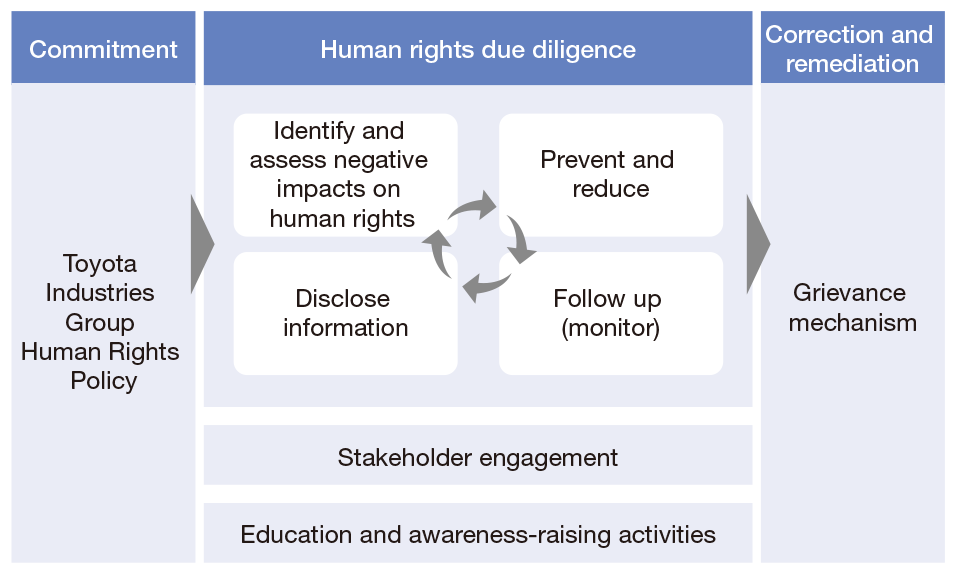
Formulation of the Human Rights Policy
Toyota Industries has formulated the Toyota Industries Group Human Rights Policy (“Human Rights Policy”) under the belief that we should step up our ongoing human rights initiatives.
While giving consideration to the opinions and information provided by external experts and other parties, the Human Rights Policy was formulated after discussions and approval by the CSR Committee (currently the Sustainability Committee). It is positioned as the highest-level policy related to human rights within the Toyota Industries Group.
In our Human Rights Policy, we declare that we respect internationally recognized human rights (prohibiting forced labor and child labor, ensuring the right to freedom of association and eliminating discrimination, etc.) as specified in the International Bill of Human Rights and the International
Labour Organization (ILO) Declaration on Fundamental Principles and Rights at Work. We also endorse the United Nations Guiding Principles on Business and Human Rights and pledge to make efforts to practice these principles.
Human Rights Issues Covered by the Toyota Industries Group Human Rights Policy
Wages (minimum wage, living wage); excessive or inappropriate work hours; occupational safety and health; social security; harassment; immigrant labor, forced labor and other modern slavery; child and young labor; discrimination (against race, nationality, gender, LGBTQ+, persons with disabilities and discriminated communities, etc.); diversity, equity and inclusion; restrictions on the freedom to choose and change residence (corporate activities forcing local residents to leave their homes, forcing employees to accept job relocations); freedom of association; human rights issues related to technology and AI; privacy; consumers' safety and right to know; freedom of expression; indigenous peoples and local residents (health of local residents, conservation of the environment in communities, land rights, access to water, noise reduction, etc.); the environment and climate change; intellectual property rights; acts of corruption; supply chain management; access to remediation, etc.
Toyota Industries Group Human Rights Policy
Established in September 2021
We, Toyota Industries Corporation and our subsidiaries, have constantly endeavored to make the earth a better place to live in and enrich society based on the Toyoda Precepts (Corporate Creed) and our Basic Philosophy since its founding.
We recognize that it is essential to respect the human rights of all people and comply with laws and regulations to continuously contribute to the harmonious and sustainable development of society and the earth through all corporate activities.
This policy ensures that we respect internationally recognized human rights based on the United Nations Guiding Principles on Business and Human Rights.
Toyota Industries Group regards this as its highest policy related to human rights.
1.Commitment to respect human rights
We recognize that our corporate activities ranging from research, development, and procurement to the provision of products and services, may directly or indirectly affect human rights.
We respect internationally recognized human rights, including prohibition of forced labour and child labour, right to freely associate or not associate, and elimination of discrimination, expressed in the International Bill of Human Rights and the International Labour Organization’s Declaration on Fundamental Principles and Rights at Work. We also support the United Nations Guiding Principles on Business and Human Rights and strive to put them into practice.
We comply with laws and regulations of each country and region where we conduct business. We seek ways to respect internationally recognized human rights to the extent possible when laws and regulations of each country or region differ from internationally recognized human rights.
2.Scope
This policy applies to all executives and employees of the Toyota Industries Group. We also expect all our business partners, including suppliers, to understand and support this policy.
3.Human rights due diligence
We establish and continuously implement a human rights due-diligence process to identify, prevent, mitigate negative impacts on human rights related to our corporate activities and account for how we address them based on the United Nations Guiding Principles on Business and Human Rights.
4.Correction and remediation
We endeavor to correct and remedy any negative impact on human rights through appropriate means where we identify that we have caused or have been involved in such case. We also establish consultation service for individuals and communities who may have been adversely impacted.
5.Education and awareness-raising activity
We conduct appropriate education and awareness raising activities to our executives and employees and strive to prevent negative impacts on human rights through the dissemination of this policy. We also reflect this policy in related policies and necessary procedures to embed it throughout our corporate activities.
6.Monitoring and information disclosure
We continuously monitor the status of compliance with this policy and make improvements as necessary. We also periodically disclose the status of initiatives related to human rights through our website, integrated report, and other communication tools.
7.Dialogue with stakeholders
We engage in dialogue and consultation with relevant stakeholders to identify negative impacts on human rights and address to them appropriately.
 Toyota Industries Group Human Rights Policy PDF [217.3KB / 2pages]
Toyota Industries Group Human Rights Policy PDF [217.3KB / 2pages]
Implementation Structure
TICO recognizes that the Group’s corporate activities, from research and development to procurement and provision of products and services, may directly or indirectly impact human rights. To respond to various human rights issues, we have established the Human Rights Task Team, which is led by the Human Resources Department and consists of the relevant departments, including the Enterprise Risk and Compliance Management, Procurement, and Legal departments. In accordance with the Human Rights Policy, the team gathers and shares information on the latest social trends related to human rights and translates these insights into the formulation and implementation of action plans.
Human Rights Due Diligence
We conduct human rights due diligence to specify, prevent and mitigate negative impacts on human rights caused by the Toyota Industries Group’s corporate activities.
The Human Rights Task Team has evaluated human rights issues relevant to the corporate activities of the Toyota Industries Group, which were identified based on the handbooks of Japan’s Ministry of Justice and the Japan Federation of Economic Organizations (Keidanren) as well as checking items defined by external rating agencies. Consequently, we have specified two priority human rights issues, namely immigrant labor and raw material procurement, and have been undertaking related activities.
Major Initiatives
Immigrant Labor (Forced Labor of Non-Japanese Workers)
Amid the growing attention to protecting and respecting the human rights of non-Japanese workers, TICO regards forced labor of non-Japanese trainees working under Japan’s Technical Intern Training Program as one of its priority human rights issues.
External experts have pointed out that there is possibly a higher risk of forced labor when accepting trainees from overseas through local brokers, as some of these brokers may charge exorbitant placement fees to trainees, who end up coming to Japan with a huge debt.
TICO periodically conducts a survey to check trainee enrollment and the appropriate operation of the program at its consolidated subsidiaries and major suppliers in Japan. From FY2025, we have expanded the survey to include 40 additional domestic dealerships of Toyota Material Handling Japan to conduct the survey with broader coverage. In the most recent survey, we found that 213 companies have accepted trainees under the program. The largest number of trainees was from Vietnam, accounting for 40% of all trainees.
At our consolidated subsidiaries, we have further surveyed the fees charged to these Vietnamese trainees. As a result, we have confirmed that no trainees have been charged fees in excess of the upper limit specified in Vietnam’s domestic law. Our efforts in the future will be geared toward reviewing fee charging, which could lead to forced labor of non-Japanese trainees. In FY2024, we joined the Japan Platform for Migrant Workers towards Responsible and Inclusive Society (JP-MIRAI)*1. By collaborating with the external stakeholders, we have set up a consultation hotline for non-Japanese trainees working under the program.
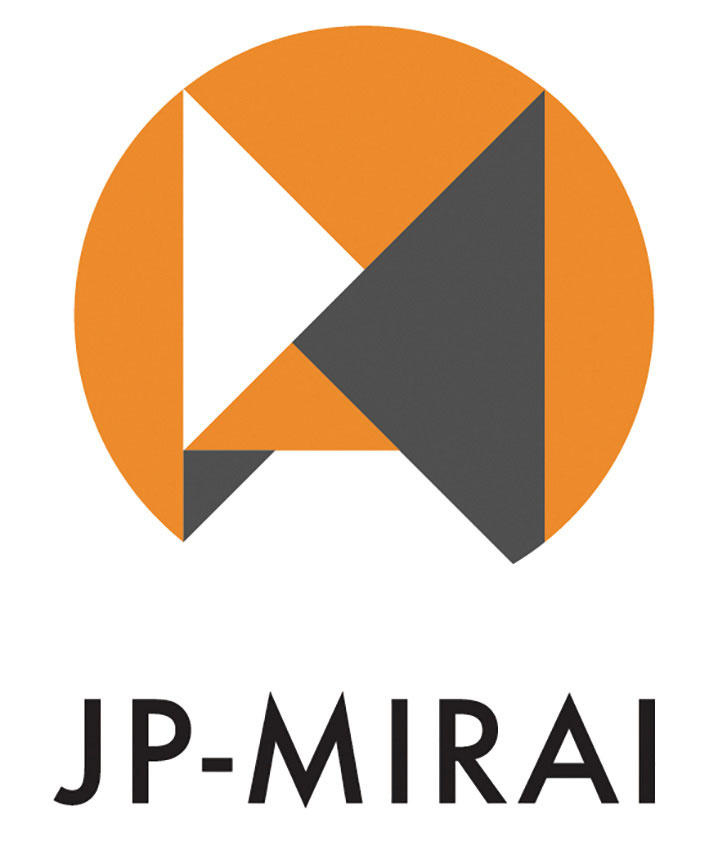
*1: Organization with a total membership of more than 800 diverse stakeholders, including private-sector companies, local governments, NPOs, scholars, and lawyers
<Major activities>
• Provide information (in multiple languages) about daily lives and work via a portal site and smartphone app
• Operate a multilingual consultation hotline
• Provide a system to settle matters out of court through the Dispute Resolution Center of the Tokyo Bar Association
Raw Material Procurement (Minerals)
As another initiative to respect human rights, TICO has formulated the Policies and Approaches to Responsible Mineral Sourcing based on the OECD Due Diligence Guidance for Responsible Supply Chains of Minerals from Conflict-Affected and High-Risk Areas.
Under the policies, we have been conducting procurement activities excluding minerals that may involve human rights abuses, such as funding armed groups, child labor, forced labor and working under poor conditions.
As one specific effort, we support the purpose of the Responsible Minerals Initiative (RMI)*2, an organization leading global efforts related to conflict minerals, and have been using the RMI’s survey form, which is the industry’s standard, to periodically perform a minerals survey and exercise due diligence throughout the supply chain. In addition to the conventional target minerals—3TG (tin, tantalum, tungsten, and gold)—we began surveying and performing due diligence on cobalt and mica from FY2025, for which 95% of our suppliers returned the survey form. We checked the presence of targeted minerals, identified smelters/refiners in the supply chain, and conducted risk diagnosis and assessments of the identified smelters/ refiners. The results showed no significant risk. If we do find a significant risk in our supply chain, we will implement risk mitigation measures, including requesting the relevant supplier to take corrective action. Going ahead, we will continue to cooperate with our suppliers and engage in responsible mineral sourcing throughout the supply chain.
Rate of performing an annual survey on conflict minerals at applicable suppliers (non-consolidated): 95%
*2: An organization leading efforts concerning conflict minerals, in which more than 300 companies and organizations take part globally
Results of Exercise of Due Diligence on Smelters by Mineral
| Tin | Tantalum | Tungsten | Gold | Cobalt | Mica | Total | |
|---|---|---|---|---|---|---|---|
| Number of white smelters*3 | 65 | 34 | 32 | 88 | 50 | 3 | 272 |
*3: Smelters in conformance with the Responsible Minerals Assurance Process (RMAP) offered by the RMI
Policies and Approaches to Responsible Mineral Sourcing
Toyota Industries Corporation and its subsidiaries promote the acquisition of materials with full deliberation and care to avoid the procurement or usage of materials which are unlawful or which are obtained through unethical or otherwise unacceptable means.
We recognize that the situation surrounding conflict minerals originating in Covered Countries is a significant social issue in supply chains. We pursue procurement and usage that are free from conflict minerals originating in Covered Countries and relating to illegal conduct including human rights infringement. We also recognize that human rights abuses such as child labor in the procurement of cobalt, etc., are a serious social problem, and we pursue procurement activities that do not include minerals that are suspected of being involved in such abuses.
To achieve such procurement and usage, we conduct inquiries tracing back through our supply chains and confirm if such minerals are used. In addition, we take appropriate steps to discontinue procurement of materials that can cause social problems such as human rights violations or financing of armed groups, if such usage is detected. Based on mutually beneficial relationships, we ask our suppliers to understand our policies and approaches and to conduct responsible material procurement.
Child Labor
In its Human Rights Policy, TICO declares that it will prohibit child labor, which deprives children of an opportunity to receive education and forces them to work at an early age, hindering their sound growth.
In addition, our work regulations prohibit the recruitment of persons below the age of 15.
Furthermore, we have formulated a response manual to handle cases where child labor is discovered, including situations involving document forgery.
Harassment
Toyota Industries seeks to provide an environment for all employees to work with peace of mind. We do not tolerate any form of harassment, sexual or otherwise, as well as acts that harm the dignity of individuals.
As specific efforts, we clearly state in our work regulations that we prohibit harassment and apply disciplinary punishments to those who commit it. In addition, our Toyota Industries Group Code of Conduct clearly states that we will not engage in any conduct that may cause discomfort to others, including acts of harassment.
Wages
Toyota Industries complies with wage-related laws and regulations and pays wages as specified in advance in the labor contract and work regulations. The full amount*4 in the corresponding currencies is directly paid to employees one or more times per month on a predetermined day. We work to ensure that our wage level conforms to the legally mandated minimum wage level and provides sufficient living wage to satisfy the basic needs of employees and their families.
In Japan, we treat regular employees and non-regular employees equally and in a balanced manner based on the principle of equal pay for equal work to avoid unreasonable differences in their treatment.
*4: Excluding deductions made in accordance with legally mandated procedures
Unstable Employment
We are committed to providing as much employment stability as possible to develop a highly competent human resources pool with a deep understanding of our values.
In addition, we strive to employ fixed-term workers under appropriate working conditions in accordance with the labor laws and customs of each region in order to respond to fluctuations in demand due to the external environment and seasonal reasons.
Correction and Remediation (Setting Up a Grievance Mechanism)
In each region, the Toyota Industries Group operates a whistle-blower system (helpline) that allows our employees, suppliers and other relevant parties to report and seek advice on compliance-related matters. We also accept reports and consultation requests on harassment, discrimination and other matters related to human rights through law firms and external websites. If the matter is deemed to have impacts on human rights, we remedy the affected parties.
We also have rules to protect the confidentiality of information on persons making reports and prohibit negative treatment as a result of seeking advice or cooperating in an investigation. We thus have a system that allows anyone to report or seek advice with a sense of security.
In FY2025, we received reports and consultation requests about harassment and discrimination. As a result of factual investigations, none constituted a serious infringement of human rights that will lead to a significant impact, and we made an appropriate response to each case in accordance with their respective situations.
Education and Awareness-Raising Activities
To remain a company committed to respecting the human rights of all people involved in our corporate activities, we participate in lectures hosted by the government and human rights organizations and joint study sessions with other Toyota Group companies. We also hold training sessions for consolidated subsidiaries, in which their top management participates. Our education and awareness-raising activities target executives and all employees and aim to deepen their knowledge of human rights and encourage them to take action respectful of others in their daily work. Along with providing induction training for new employees, grade-based training and other conventional programs, we have been making proactive efforts, such as designating a particular week as “Human Rights Week” and utilizing e-learning programs. As for harassment, we provide education once a year to instill knowledge on harassment in executives, directors, managers, and shop floor leaders.
Training to Raise Human Rights Awareness
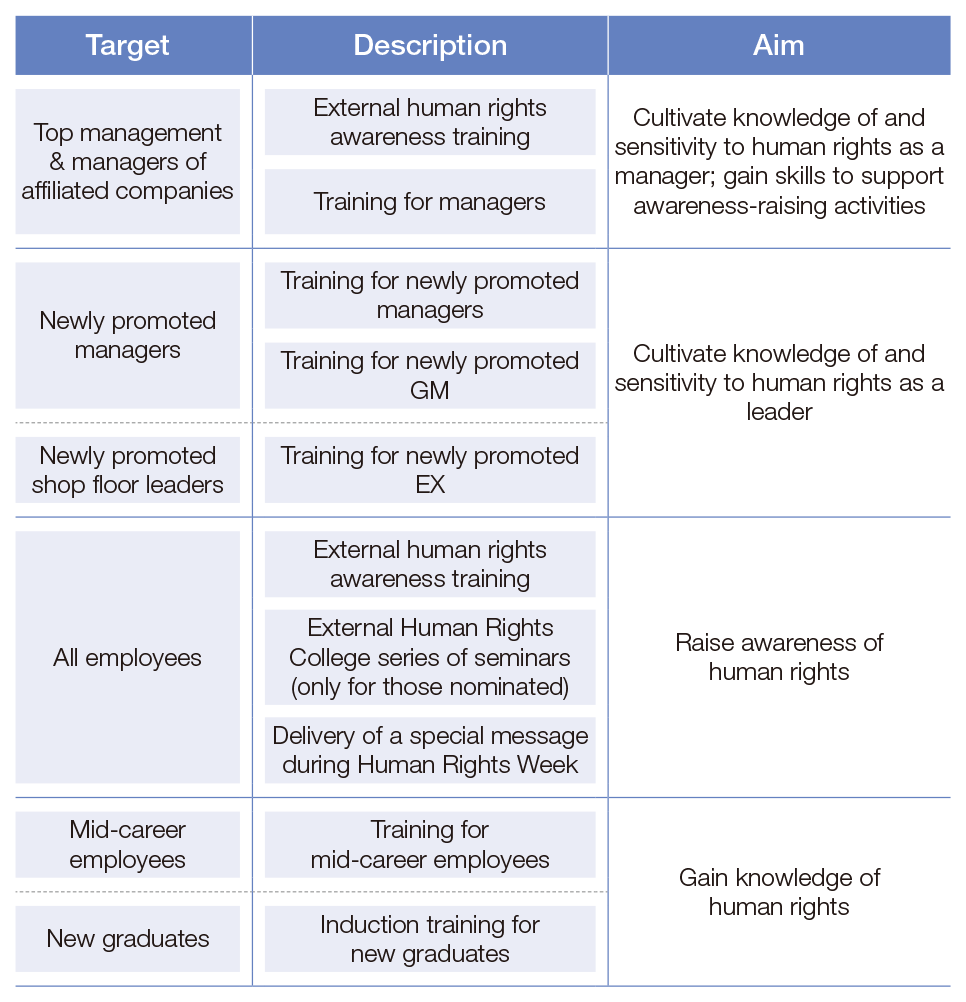
Training on Harassment
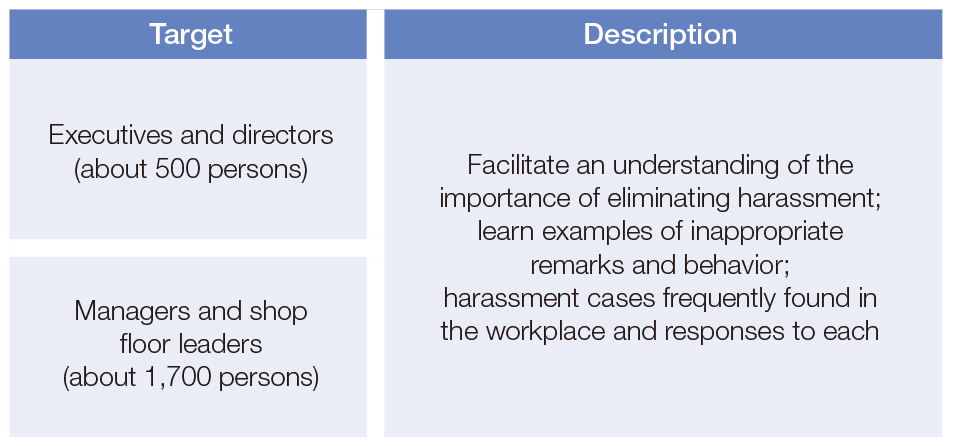
Stakeholder Engagement
Toyota Industries promotes dialogue with various internal and external stakeholders and works with its top management and the relevant departments to reflect such dialogue in its future corporate activities.
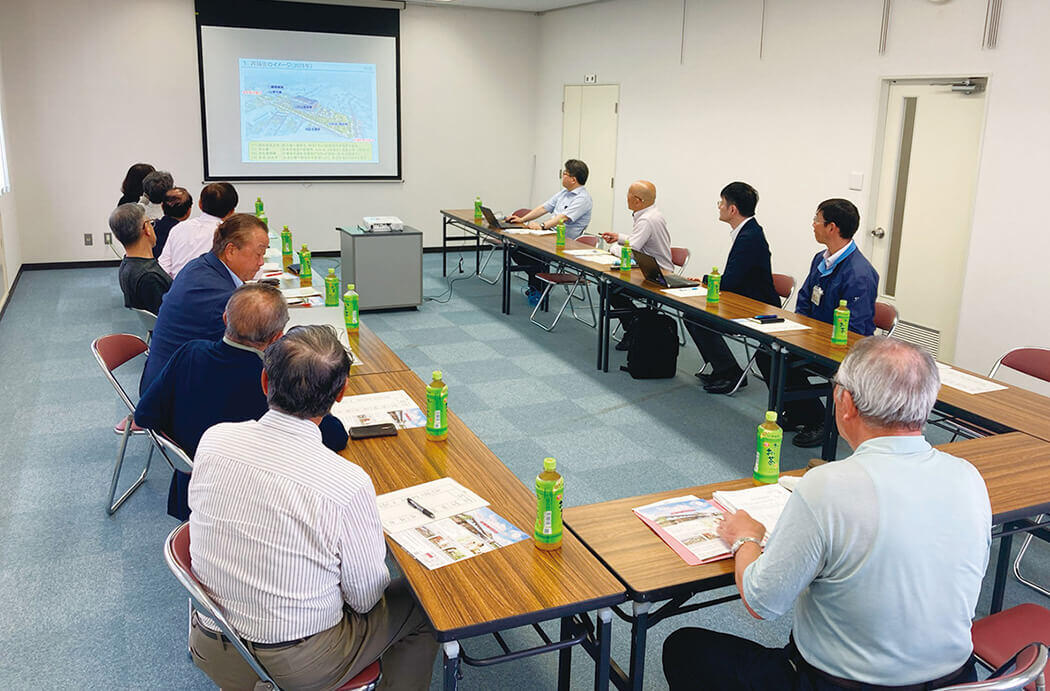
Communication Channels
Employees.................................. Labor-management round table meetings, annual labor-management meetings, hotline
Shareholders and investors........ Toyota Industries Reports, Toyota Industries' official website, ESG dialogue
Business partners....................... Procurement policy meetings, hotline
Local community......................... Inviting residents to Toyota Industries' events, participating in local events, local community meeting
